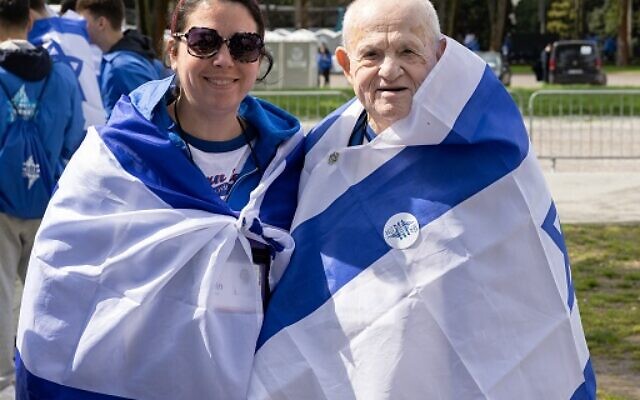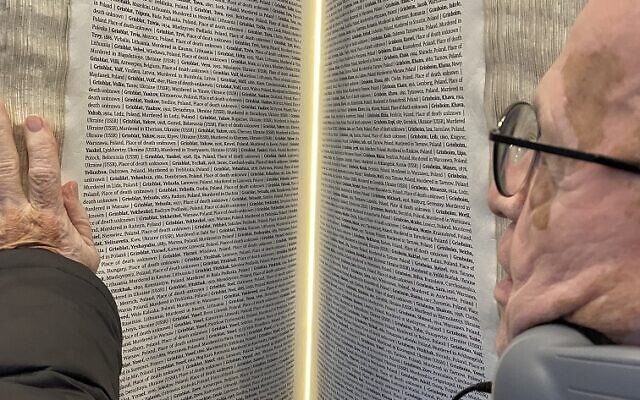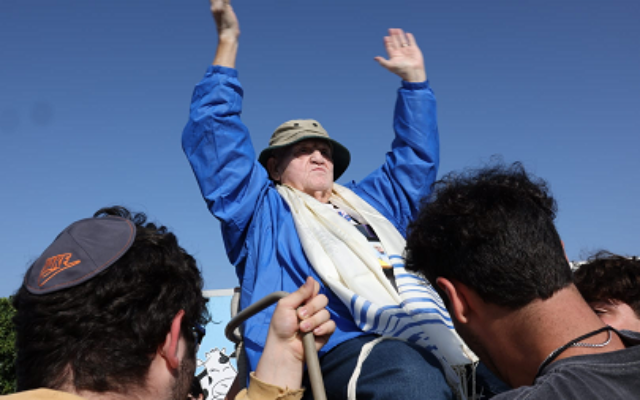Grandfather, Granddaughter March for the Living
Hershel Greenblat and Erin Boynton traveled to Poland and Israel take part in the March of the Living.

Hershel Greenblat celebrated his 82nd birthday in Israel this spring, joyfully hoisted on a chair by a group of students. It was one of the memories that the Holocaust survivor from Atlanta will never forget while on this year’s March of the Living Southern Region program from April 16-30, accompanied by his 35-year-old granddaughter, Erin Boynton, who lives in Charleston.
The March of the Living is an annual educational and experiential program for youth and adults that begins in Poland and ends in Israel. In Poland, participants visit places such as Krakow and Majdanek, where Jews once lived, as well as Holocaust sites such as the Auschwitz–Birkenau and Treblinka concentration camps, and the Lodz Cemetery and Ghetto. In Israel, the itinerary included not only historic destinations and opportunities for shopping in the shuk, but the observance of Yom HaZikaron (Israel’s Memorial Day) and this year the celebration of the historic 75th anniversary of Israel Independence Day (Yom HaAtzmaut).
Greenblat’s own Holocaust survival story is unique. Greenblat was born in a cave in what is now Ukraine, where his parents, along with a number of other Jewish individuals, families and resisters, hid to escape the invading Nazis. At one point, Greenblat’s parents had to leave baby Hershel (Grischa, as he was called then) in the care of others in the cave for several weeks to seek medical care for his mother who was wounded by shrapnel when she was outside of the cave for a short time.
Despite many hardships, the family reunited, and all survived the war. Later, two sisters were born. After the war, the family lived in displaced persons camps in Austria and eventually came to the United States, arriving in Atlanta in 1950.
A tireless and passionate speaker, Greenblat shares his story at schools all around Georgia and other states in the spirit of educating students about the horrors of the Holocaust and the dangers of not knowing the history.

He and Erin had planned to take the March of the Living trip together in 2020, but it was canceled due to COVID until this year. With the 80th anniversary of the liberation of Auschwitz and the 75th anniversary of the establishment of the State of Israel, it was a momentous time to go.
In Poland, the trip proved very emotional. At Auschwitz, Greenblat described looking among the books containing four million names of Jews who had perished, hoping to find the names of his own family members. He found the names of his paternal grandparents, Gedalia and Ethel, but didn’t have time to find those on his mother’s side.
“I was upset that I did not have time to do that, but Erin was there to comfort me. Finding their names won’t bring them back, but we can remember them. There were just so many books, so many names,” Greenblat recalled.

Walking through the gas chambers and crematoriums at the Majdanek death camp in Poland where scholars say between 60,000 – 80,000 Jews were murdered was also an intense experience as some of Greenblat’s father’s family had been taken there and to Belzec, another camp built to murder Polish Jews.
“I felt that my heart was gonna just, you know, stop,” Greenblat said, recalling walking through the death camps and touring the Ramah Synagogue. Studying and reading about these places doesn’t nearly prepare you for the impact you feel when you are actually there, he explained.
Although Boynton took the trip primarily to accompany and support her “Papa,” as she affectionately calls her grandfather, she also wore her educator’s hat, too. Boynton oversees programming for Holocaust education and genocide awareness for the Charleston Jewish Federation. Previously, she taught high school for seven years. So, for her, the trip represented something that she said, “I’m not only personally invested in, but professionally connected to as well.”

Describing what it was like to share these profound experiences with her grandfather, Boynton said: “My favorite quote is from Golda Meir that says if you can’t weep with your whole heart, you can’t laugh with it either. And that’s what I really feel like this trip embodied. You go from such despair and such sadness in Poland to such joy and celebration in Israel…The sorrowful going through the gas chamber in Majdanek, as a moment with my Papa, is just a moment I’m never going to forget in my entire life. But then also the moment that we landed in Israel on his 82nd birthday. We drove straight to the beach. He got an aliyah, the kids put him in the chair, lifted him up, and we were singing!”
Boynton was also impressed with how well the students cared for her grandfather and the other three survivors on the trip. For Greenblat, making personal connections with the students, most of whom were from Florida, was a very important part of the trip. Many wrote heart-warming sentiments in his trip diary thanking Hershel for sharing his story and being a role model to them.
Hannah Schinder wrote: “Hershel, happy, happy birthday! You’re such an inspiration to me and my generation. Your words spark new thoughts every second in my head on how I will make this world the best it can be.”
For Greenblat, making an impact on these youth and sharing both emotionally difficult and joyous experiences with his granddaughter, Erin, made this journey an unforgettable, once-in-a-lifetime pilgrimage.
In summing up, Greenblat said, “What I saw at all these places was a sense of life changing thoughts — not how it happened, but why. And knowing that in my own small way, when I speak, some of the students will say on my behalf, ‘Never again.’”
- rosh hashanah
- Community
- Fran Putney
- Hershel Greenblat
- March of the Living Southern Region
- Erin Boynton
- Poland
- Israel
- Krakow
- Majdanek
- Auschwitz-Birkenau
- Treblinka
- Lodz Cemetery
- Yom hazikaron
- yom haatzmaut
- holocaust
- 75th anniversary
- Belzec
- Ramah Synagogue
- Charleston Jewish Federation
- Golda Meir
- Hannah Schinder



comments